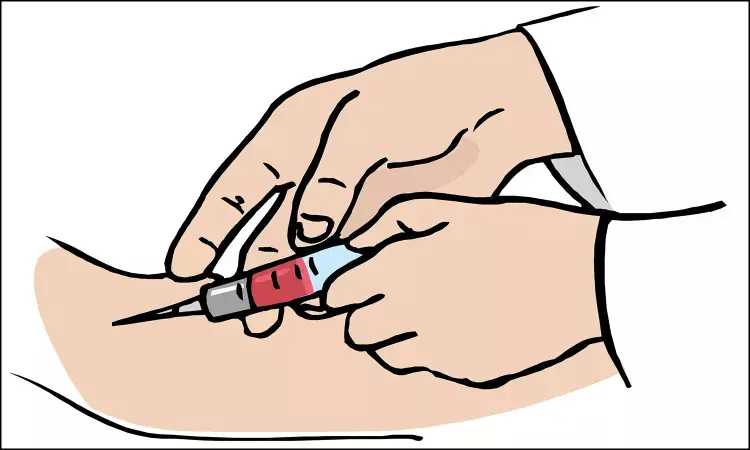- Home
- Medical news & Guidelines
- Anesthesiology
- Cardiology and CTVS
- Critical Care
- Dentistry
- Dermatology
- Diabetes and Endocrinology
- ENT
- Gastroenterology
- Medicine
- Nephrology
- Neurology
- Obstretics-Gynaecology
- Oncology
- Ophthalmology
- Orthopaedics
- Pediatrics-Neonatology
- Psychiatry
- Pulmonology
- Radiology
- Surgery
- Urology
- Laboratory Medicine
- Diet
- Nursing
- Paramedical
- Physiotherapy
- Health news
- Fact Check
- Bone Health Fact Check
- Brain Health Fact Check
- Cancer Related Fact Check
- Child Care Fact Check
- Dental and oral health fact check
- Diabetes and metabolic health fact check
- Diet and Nutrition Fact Check
- Eye and ENT Care Fact Check
- Fitness fact check
- Gut health fact check
- Heart health fact check
- Kidney health fact check
- Medical education fact check
- Men's health fact check
- Respiratory fact check
- Skin and hair care fact check
- Vaccine and Immunization fact check
- Women's health fact check
- AYUSH
- State News
- Andaman and Nicobar Islands
- Andhra Pradesh
- Arunachal Pradesh
- Assam
- Bihar
- Chandigarh
- Chattisgarh
- Dadra and Nagar Haveli
- Daman and Diu
- Delhi
- Goa
- Gujarat
- Haryana
- Himachal Pradesh
- Jammu & Kashmir
- Jharkhand
- Karnataka
- Kerala
- Ladakh
- Lakshadweep
- Madhya Pradesh
- Maharashtra
- Manipur
- Meghalaya
- Mizoram
- Nagaland
- Odisha
- Puducherry
- Punjab
- Rajasthan
- Sikkim
- Tamil Nadu
- Telangana
- Tripura
- Uttar Pradesh
- Uttrakhand
- West Bengal
- Medical Education
- Industry
Novel blood test to identify individuals at risk of weight gain and diabetes

Brazil: Weight gain has become one of the worldwide epidemics which often culminates in the development of obesity and other related comorbidities like type 2 diabetes, hypertension, dyslipidemia, and cardiovascular events. Obesity is characterized by the development of a chronic, subclinical systemic inflammation, and is regarded as a remarkably important factor that contributes to the development of such comorbidities.
To reduce this morbidity, researchers at the University of Campinas (UNICAMP) in São Paulo State, Brazil, have developed a computer program that analyzes molecules in blood plasma to search for biomarkers that identify individuals who are at risk of becoming overweight and developing obesity-related diseases. The study has been published in the Journal of Frontiers in Bioengineering and Biotechnology.
The methodology developed at UNICAMP combines metabolomics (the analysis of all the metabolites in a biological sample) with machine learning, a subdiscipline of artificial intelligence. The study included 180 patients, separated into two groups: Case, formed by a combination of obese and overweight individuals, and Control, composed of eutrophic individuals. The researchers found that 18 metabolites can serve as biomarkers of metabolic processes relating to fat accumulation, five of which have the potential to predict weight gain which includes,
Dihydrobiopterin,
Argininosuccinate,
3-carboxy-4-methyl-5-propyl-2-furanpropanoic acid (CMPF),
a prostaglandin (PGB2) and
a metabolite of leukotriene (Carboxy-LTB4).
"The program screens the blood sample for five metabolites that function as biomarkers with the potential to predict weight gain," states Catharino, principal investigator of the study. "When one of these biomarkers is present in the sample, the patient will tend to develop diabetes if he or she becomes obese," she added.
"The test is 90% accurate in detecting whether the subject will gain weight without any kind of intervention. It also shows whether there's a risk of developing diseases such as diabetes, high blood pressure and dyslipidemia [abnormally elevated levels of fat in the blood]. Even before the subject loses weight, it's possible to know whether the intervention is working well. If the metabolic processes that lead to fat accumulation are interrupted, the 18 metabolites will tend to disappear from blood plasma," stated the researchers.
The Cost-effectiveness of the test may enable health professionals to use it in the identification of obesity and its related comorbidities in early hand and to reduce the morbidity caused by the same.
For further reading click on the following link,
https://www.frontiersin.org/articles/10.3389/fbioe.2020.00006/full
MBBS
Dr K B AARTHI-has completed MBBS from SRM UNIVERSITY TAMIL NADU,Her interest is in the field of Pediatrics and Anaesthesia, also passionate in doing research and publishing articles.She joined Medical Dialogues in 2020 and publishes health news and medical updates. Email: editorial@medicaldialogues.in. Contact no. 011-43720751,9786713226
Dr Kamal Kant Kohli-MBBS, DTCD- a chest specialist with more than 30 years of practice and a flair for writing clinical articles, Dr Kamal Kant Kohli joined Medical Dialogues as a Chief Editor of Medical News. Besides writing articles, as an editor, he proofreads and verifies all the medical content published on Medical Dialogues including those coming from journals, studies,medical conferences,guidelines etc. Email: drkohli@medicaldialogues.in. Contact no. 011-43720751


